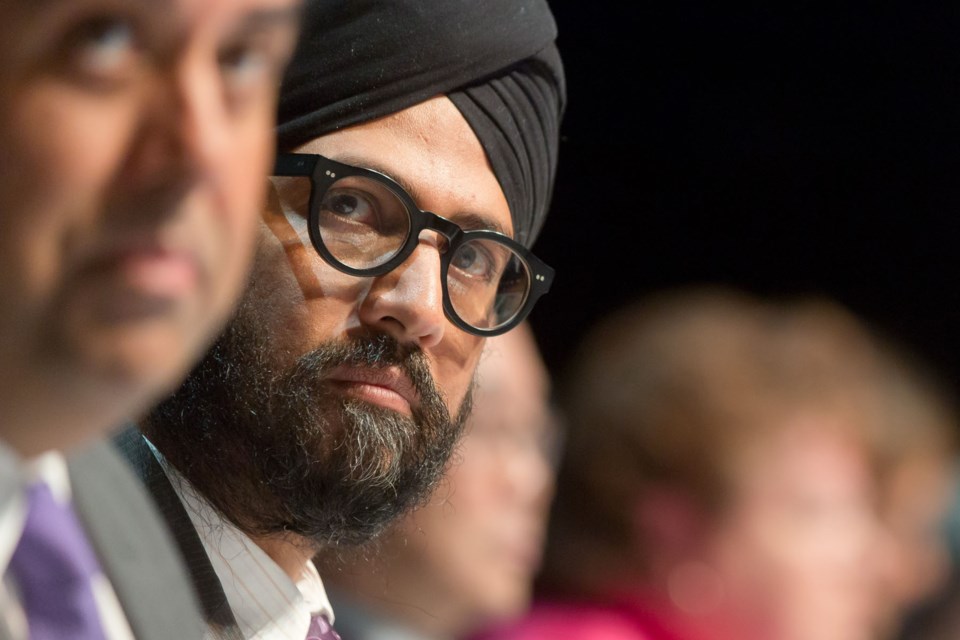There will be no recount of initial votes in the Richmond-Queensborough riding, after Elections BC refused a request by the BC NDP to take a second look at the ballot boxes from last week’s provincial election.
The results were close — with BC Liberal candidate Jas Johal squeaking out victory over New Democrat Aman Singh, by 263 votes — and a final tally should be complete by May 24, when absentee votes are added to the initial vote count, which includes advanced and general polls.
Two other recount requests by the NDP were also rejected — in Coquitlam-Burke Mountain and Maple Ridge-Mission.
Meanwhile, recounts in Vancouver-False Creek and Courtenay-Comox (requested by the BC Liberals), where the NDP won by just nine votes, were granted.
The Courtenay-Comox recount is the one most likely to determine the outcome of the election, including whether or not the Liberals hold a majority of seats. Presently, they hold 43 seats to the NDP’s 41 and the Green Party’s three. Forty-four seats clinches a majority.
Glen Sanford, deputy director for the BC NDP, did not tell the News on Friday on what legal grounds a recount had been asked for in Richmond-Queensborough, instead stating: “We think it’s reasonable to recount the ballots, double-check everything.”
On Saturday, Elections BC refused the party’s request, stating, via a news release that “recount requests were not accepted if they did not meet the requirements of the Election Act. In cases where the difference between the top two candidates is greater than 100 votes, recount requests must include factual basis that ballots were not correctly accepted or rejected, or that a ballot account does not accurately record the number of votes for a candidate.”
A recount was granted in Vancouver False Creek because there was a discrepancy with a ballot box.
The two recounts are in addition to tallying absentee votes, which account for about nine per cent of the total vote in B.C. this election (176,000 out of 1.98 million votes). Absentee votes are those that are cast outside of a person’s voting station.
About half of absentee votes are simply people voting inside their electoral riding, but at a different station than what their voting card indicates, according to Elections BC.
“Up to four electoral districts may flip from one party to another when the final count is announced,” suggested UBC economist Kevin Milligan on UBC.ca.
Based on data from the last election, Milligan gives the Liberals an 11.4 per cent chance of winning a majority, considering the absentee votes have a “systemic” NDP lean.
Absentee votes should narrow the gap between Singh and Johal in Richmond-Queensborough, but the chance of Singh winning is still very low, at six per cent, according to Milligan.
There were 18,027 initial votes counted in Richmond-Queensborough on election day, meaning there should be about 1,800 absentee ballots to count (although last election, in the Richmond-East riding, the rate of absentee votes was about 10 per cent less than the provincial average).
A straight up comparison between this election and last is impossible in Richmond-Queensborough, because it is a new riding.
About 85 per cent of the riding is the old Richmond-East riding and it now includes New Westminster’s Queensborough neighbourhood.
There were 1,697 absentee votes cast in Richmond-East, in 2013, and they showed a slight edge to the NDP, compared to the initial count; the NDP secured 30.3 per cent while the Liberals took 51 per cent. The final count (advanced and election-day voting) saw 29 per cent for the NDP and 55 per cent for the Liberals.
In the New Westminster riding (where Queensborough used to be counted), the final vote was 49 per cent NDP and 33 per cent Liberal. In absentee voting, the NDP got 51 per cent of the votes; the Liberals 29.9 per cent.
So, based on the 2013 results, Singh seems likely to pick up some votes on Johal.
The recounts and addition of absentee votes will be known May 24 when everything should be finalized by Elections BC, unless a riding is so close (0.02 per cent between candidates) that it requires a judicial recount.
If the status quo remains (and odds are it does, said Milligan), the Liberals would hold the first opportunity to form government, according to UBC political scientist David Moscrop.
Premier Christy Clark can form a minority government with support from the BC Green Party, or create a coalition with the Greens (in which case the Greens would hold cabinet positions).
If Clark fails to do so, said Moscrop, she could call a new election. However, the Lt. Gov., Judith Guichon, would likely give the NDP a chance to form government.
Moscrop said, via Twitter and MacLeans.ca, that any minority government arrangement is legitimate, however they are usually not long-lasting (coalitions are stronger).
Green leader Andrew Weaver has indicated electoral reform and campaign finance reform are of paramount importance in a minority situation, with either the Liberals or New Democrats.
He told the Vancouver Sun this week that a coalition is unlikely.



